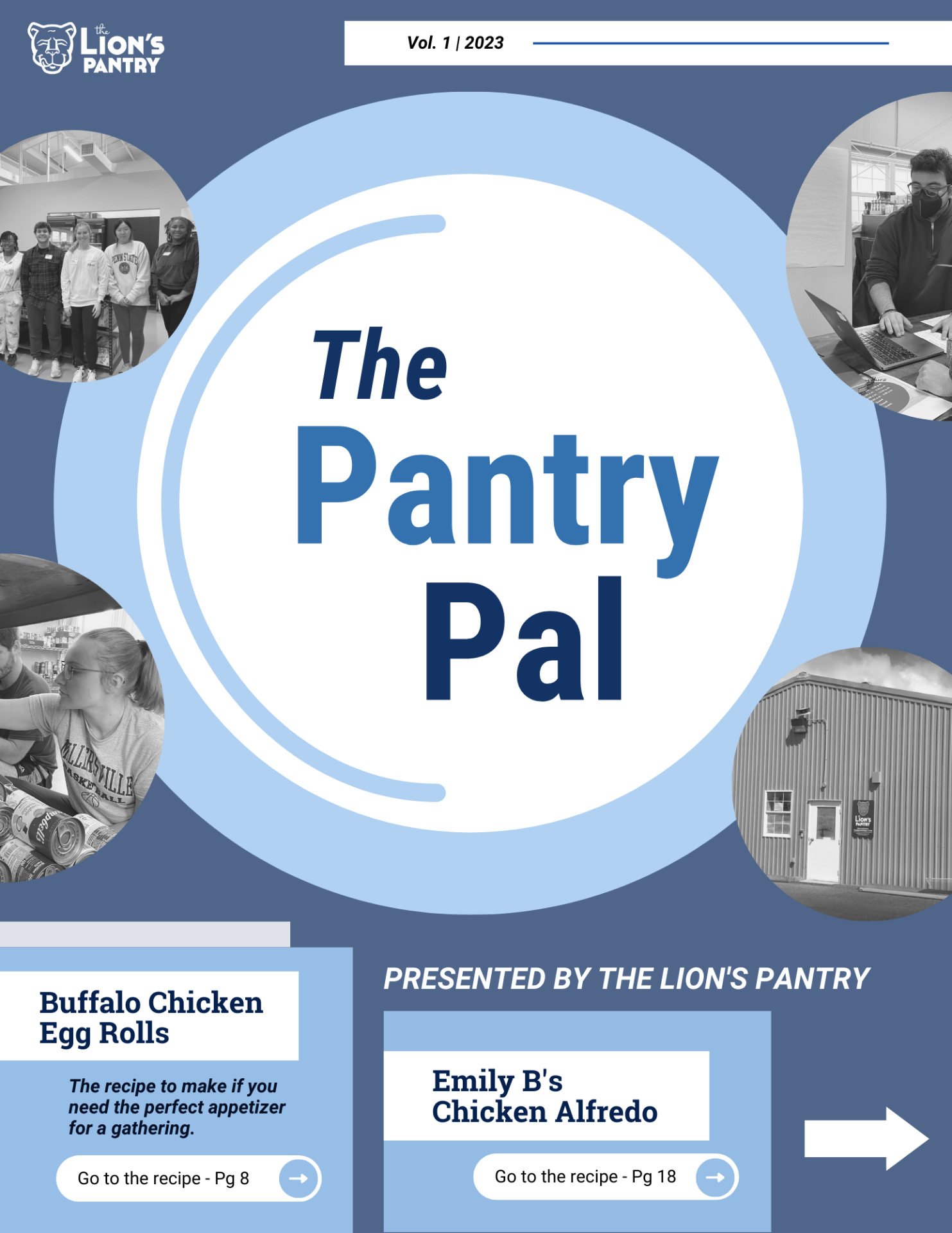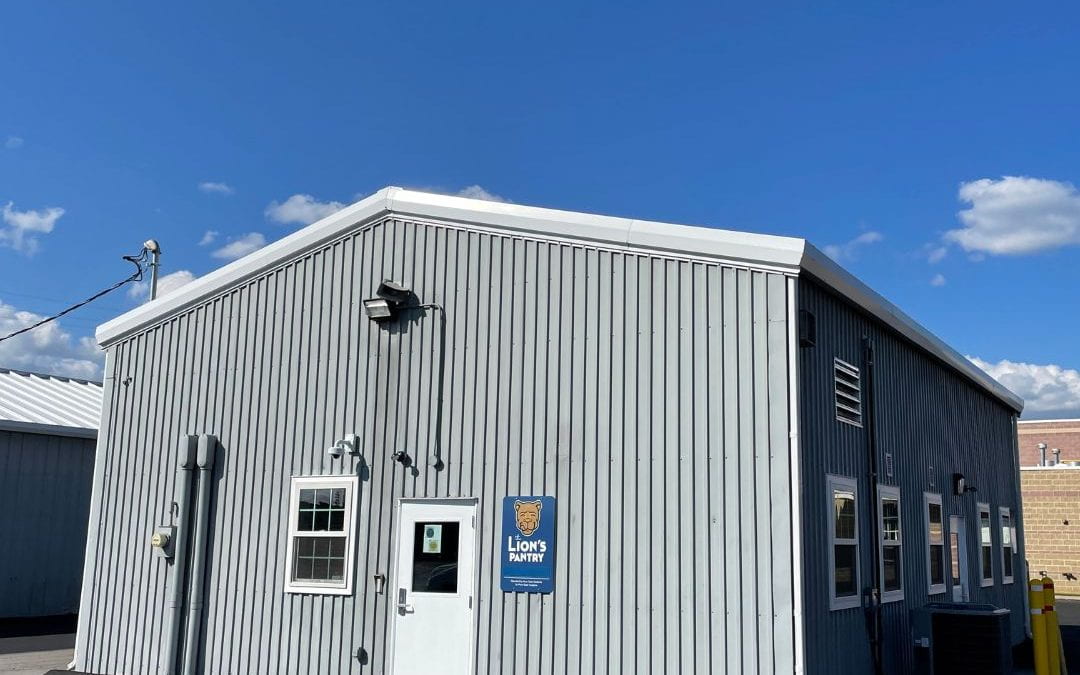
Blog, Lion's Pantry News, Uncategorized
Are you interested in holding a leadership role within The Lion’s Pantry, Penn State’s student-run food pantry that helps feed students with a valid PSU ID?
The Lion’s Pantry is happy to announce open Executive Board positions for the upcoming (2023-24) academic year. We are looking for the following positions: Vice President, Treasurer, Secretary, Cub Pantry Coordinator, Facility Coordinator, Engagement Director and Outreach Director. Please see below for more information about these positions.
If interested in one of these positions, please fill out this application by noon (12 p.m. EST) on Tuesday, April 11. If selected to participate in an interview, you will receive an email from The Lion’s Pantry 2023-24 President Nick DiPierro at ngd5090@psu.edu. We look forward to receiving your application!
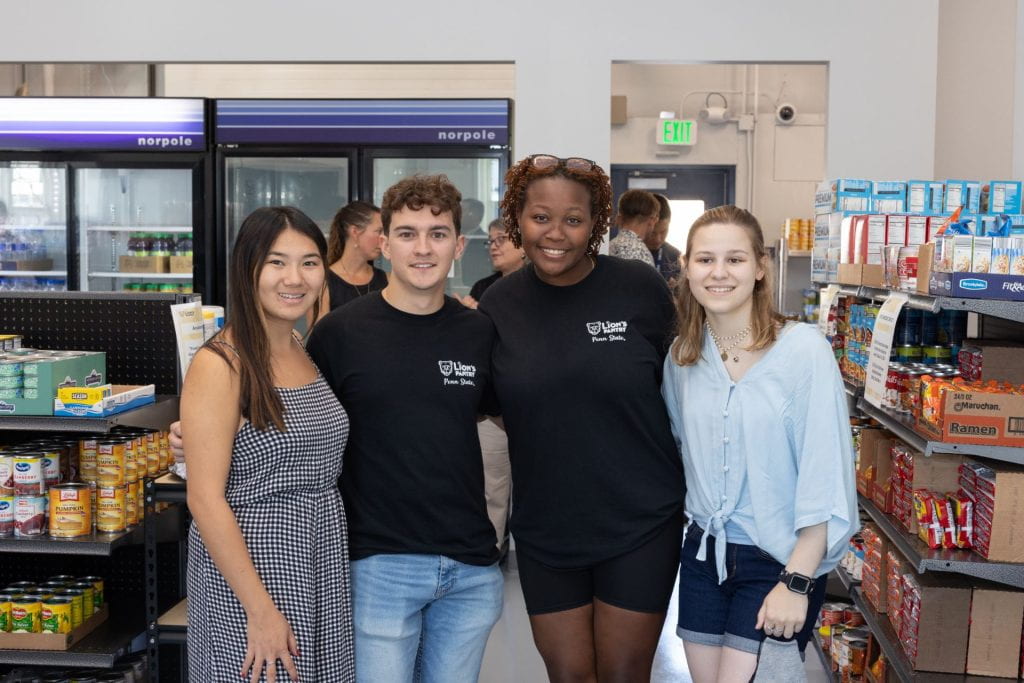
VICE PRESIDENT
Brief Description
The Vice President should have strong leadership skills, be able to work in teams and have good time management abilities. They lead executive meetings and assist other executive members with general tasks. The Vice President is also expected to create ideas, initiatives and strategies for the organization. As such, the Vice President should strive to be knowledgeable and comfortable with all aspects of the organization and show a degree of personal initiative.
Responsibilities
The Vice President is responsible for many tasks and should expect to dedicate no less than 7-9 hours to The Lion’s Pantry per week.
Responsibilities include — but are not limited to — the following:
- Delegate mandatory officer trainings attendance at the beginning of each school year
-
- Certain executives would be suited to attend specific meetings
- Help organize new member orientation
- Attend executive meetings
-
- Lead meeting if President is absent
- Provide updates and information to General Body.
-
- Meeting reminders, event updates, etc.
- Assist President with overseeing executive member activities
-
- Ensure each member is completing required tasks
- Assist members when they need it
- Help members come up with new ideas
- Be present at meetings with stakeholders, University staff/faculty, partners, etc.
- Be willing to take lead on some events and project
- Create, lead, and implement projects to better operations, outreach, advocacy, etc.

TREASURER
Brief Description
The Treasurer oversees our ASA account and budget for the organization. They must record all financial transactions for the club. Potential candidates should be meticulous, organized and detail oriented. The Treasurer will be responsible with communicating at a minimum of a bi-weekly basis with the Advisor/Facility Coordinator to ensure purchasing, invoicing and operations are running smoothly.
Responsibilities
The Treasurer should expect to contribute no less than 5-7 hours to The Lion’s Pantry per week. Responsibilities include — but are not limited to — the following:
- Attending mandatory officer training during the first week of the semester
- Note: Failure to do this will result in the suspension of the organization
- Preparing the organization’s budget, presenting it to the executive team for approval, and ensuring that club activities adhere to the budget
- Maintaining accurate financial records in conjunction with the Advisor.
- Records can be requested from ASA at their office in the HUB
- Transacting business only through our ASA account
- Using purchase orders for organization needs
- Updating list of members able to use purchase orders to include the President, Vice President, and Treasurer
- Submitting receipts to ASA to refund members in the event any member uses personal funds for the organization
- This must be done in a timely manner
- Providing at a minimum a bi-weekly finances update to the board at weekly meetings. The board will determine based on the current situation of the pantry how often these updates will be given and what materials should be included. These may include but are not limited to:
- Income, expenses, outstanding balances, etc.
- Any updates on check requests or purchase orders
- Budget information and discussion about any major spending/project budgets in consideration for the future
- Strive to develop surface level skills with excel to be used in presentations, weekly budget updates, etc.
- Attending executive and general body meetings
- Assisting with organization events: annual food drives, any potential volunteer opportunities that arise, etc.
- Provide insight on how these events will impact the pantry (either negatively or positively).
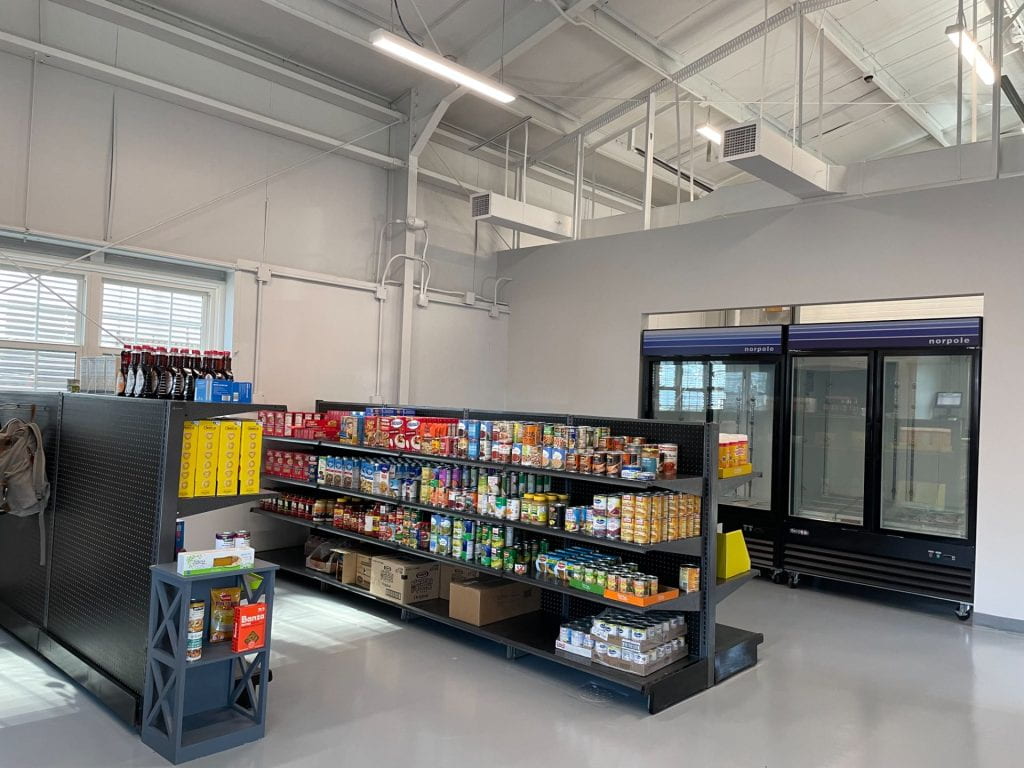
SECRETARY
Brief Description
The Secretary has the role of managing the Lion’s Pantry communications via email and organizing and documenting the functions of the Lion’s Pantry executive team. The secretary should be organized and able to work with a wide variety of individuals within and outside of the organization. This position is vital as it ensures that proper communication channels are maintained.
Responsibilities
The Secretary is responsible for a variety of tasks and should expect to dedicate no less than 3-5 hours to The Lion’s Pantry per week. Responsibilities include —but are not limited to — the following:
- Organize weekly meetings by sending out invitations
- Maintain correspondences via email
- Monitor, filter, and send emails to specific individuals
- Take notes during exec meetings, keep track of votes.
-
- Update board members with meeting notes and voting results.
- Help create agendas
- Help manage the Lion’s Pantry teams

CUB PANTRY COORDINATOR
Brief Description
Cub Pantries are partnerships with several offices, departments, and organizations both off and on the University Park Campus. The Cub Pantry Coordinator is responsible to maintain communications and operations within these spaces. They are also expected to brainstorm adaptations to Cub Pantries to best serve the clients of the Lion’s Pantry as well as aid the development of new and existing Cub Pantries.
Responsibilities
The Cub Pantry Coordinator should expect to contribute no less than 5-6 hours to the Lion’s Pantry per week. Responsibilities include, but are not limited to, the following:
- Tracking donations received at each Cub Pantry
- Coordinating with the Facility Coordinator to transfer supplies from the main facility to Cub Pantries and vice-versa
- Delegating weekly tasks to managers/interns
- Maintaining communications and respectful relations with each partnered space
- Attending weekly executive board meetings
- Keeping the executive board updated on any developments with Cub Pantry
- Meeting with existing and prospective Cub Pantry spaces
- Working with the rest of the executive board to further the operations and services of the Pantry in the best interests of the clients
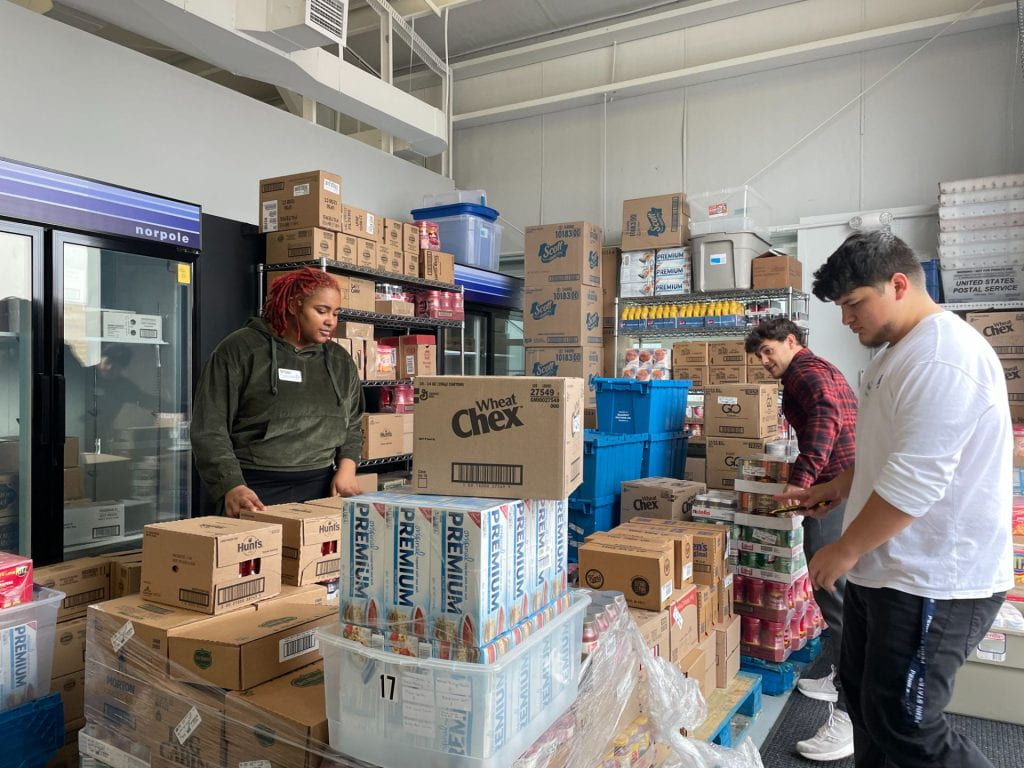
The following three positions — Facility Coordinator, Engagement Director and Outreach Director — are exciting opportunities still under development within the Executive Board.
FACILITY COORDINATOR
Brief Description
The Facility Coordinator serves as a liaison for multiple members of the team and will work most directly with the Advisor, Pantry Manager. This role is currently under development and could include tasks such as managing and ordering inventory. Preparing reports for the Advisor and Exec Team and creating and maintaining a Pantry calendar. The individual filling this position will play an important part in identifying its responsibilities and relationship to the Pantry, Exec Team, and Club.
ENGAGEMENT DIRECTOR
Brief Description
The Engagement Director is tasked with directing and maintaining relations with the student population. They will also work closely with the other members of the exec board to support the Lion’s Pantry in its operations as a food pantry and as an organization. This position and the entailed responsibilities are still under development.
OUTREACH DIRECTOR
Brief Description
In this role, the Outreach Director would be the main point of contact for donor organizations, volunteer groups, and partnered organizations. They will also work closely with the other members of the Executive Board to support The Lion’s Pantry in its operations as a food pantry and as an organization. This is just a quick summarization of the position, as responsibilities will be updated over time.

Blog, Lion's Pantry News, Uncategorized
UNIVERSITY PARK, Pa.– The Lion’s Pantry, the official on-campus student food pantry at Penn State’s University Park campus, announces spring hours beginning Monday, January 23, 2023.
Spring open hours will be as follows throughout the semester:
- Monday from 10:30 a.m. – 5:30 p.m.
- Tuesday from 11:30 a.m. – 5:30 p.m.
- Wednesday from 9:30 a.m. – 12:30 p.m.
- Thursday from 9:30 a.m. – 5:30 p.m.
- Friday, Saturday, Sunday – Closed
Hours may change based on campus closures or other extenuating circumstances, so please follow The Lion’s Pantry on social media for updates.
For students without a mode of transportation, the campus shuttle runs weekdays and drops students off on Big Hollow Rd near the Pantry’s facilities.
Created in 2014 to address food insecurity within the Penn State community, The Lion’s Pantry is both student-created and student-led. The Lion’s Pantry serves every student with a valid Penn State ID with free food and household supplies — no questions asked.
The Lion’s Pantry accepts monetary and physical donations from the Penn State community to stock its shelves with desired unexpired, unopened and non-perishable food and household products.
Physical donations can be delivered to the Pantry on Fridays between 12-3 p.m., Sundays between 10 a.m. – 1 p.m. and by appointment. Regular open hours are reserved for guests due to the high demand for our resources.
The Lion’s Pantry updates an Amazon Wishlist with needed items throughout the semester.
Financial gifts can be mailed to the following address:
The Lion’s Pantry, c/o Heide Gibson
222V Boucke Building
University Park, PA 16802
Individuals interested in volunteering with The Lion’s Pantry can participate in Sunday Workdays from 10 a.m. – 1 p.m. during the semester to help organize products and prepare operations for the upcoming week.
In addition to the Pantry’s main location off Big Hollow Rd, Cub Pantries are located across Penn State’s campus to ensure food is readily accessible to students. Cub Pantries serve as Lion’s Pantry partners across Penn State’s campus to ensure food is more accessible to students.
Students can access Cub Pantries at the following locations during the spring semester:
- Student Disability Resources, 101 Boucke
- Center for Gender and Sexual Diversity, Lower Level, 0011 HUB
- Student Veteran Center, 146 Ritenour
- Student Care and Advocacy, 222 Boucke
- Pasquerilla Spiritual Center, Lobby
- Intramural Building (IM) 20, Wellness Suite
- EMS (Earth and Mineral Sciences) Library, 105 Deike
- Pattee Library, Room W-212
- Gender Equity Center, 222U Boucke
- Physical and Mathematical Sciences Library, 201 Davey Laboratory
- University Health Services (UHS), Student Health Center
Open hours at each Cub Pantry location depend on the respective facilities.
The Lion’s Pantry team is excited to continue feeding their fellow lions, providing resources for those in need and spreading awareness about food insecurity.
Please contact thelionspantry@psu.edu with questions about spring operations.
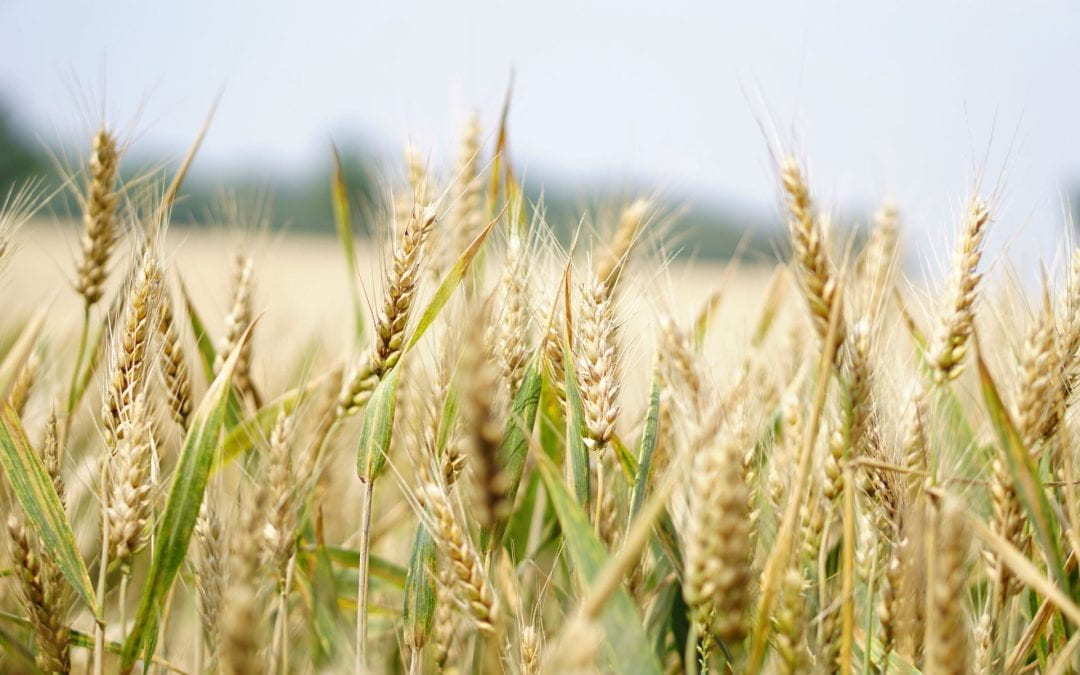
Blog, Lion's Pantry News, Uncategorized
By: Julia Mertes, Communications Intern, The Lion’s Pantry
Local and global food systems, especially with regard to the agricultural practices instated on farm land, impact food security levels.
Leslie Pillen, the associate director of Farm and Food Systems, said there are various dimensions to sustainable agriculture and every person may have a different interpretation about the subject and how it impacts the local community.
Experts define sustainable agriculture as farming utilizing sustainable techniques that help society obtain current food and textile needs while also ensuring future generations will be able to meet their needs, according to UC Davis.
“Sustainable agriculture is about protecting the resource base from which our food comes from, ensuring that there is enough healthy food for all but in a way to not undermine our actual ability to grow food,” Pillen said.
She said people may consider various factors that impact sustainable agriculture.
While “organic agriculture” provides benefits like a reduced chemical load in the environment and chemical exposure for workers, “local agriculture” provides other positives like increased support for the local economy and the protection of the viability of local environments, according to Pillen.
She said another dimension of sustainable agriculture centers around sustainability and ensuring progress is made with climate change and carbon admissions.
Through unsustainable practices, Pillen said “we are—at the end of the day—threatening the resource base that we rely on for food.”
Sophie Eyer currently works as a Student Farm intern, specifically as a wholesale manager whose primary responsibilities include managing the farm’s finances and inventory. Beyond her experience at the Student Farm, she also served as a Lion’s Pantry manager during the 2021-22 academic year.
Eyer said her experiences at Penn State shaped her interest in learning appropriate farming practices that would enable positive benefits in society.
Many large-scale farms that are owned by sizable corporations began using a profit-based system—specifically monocropping—which focuses on the unsustainable practice of producing a single type of crop with available acreage each year, Eyers (senior-community environment and development) said.
“When you’re constantly forcing the soil to just produce the same crop, it’s just going to take out the nutrients, especially if you’re not switching up the products, giving the nutrients it needs otherwise [or] participating in crop rotations that will increase yield,” Eyers said.
Eyers said many industrialized farms utilize machinery and pesticides that create runoff and pollute waterways and other ecological services. However, she said organic practices typically require minimal pesticides and herbicides, which is typically better for the environment, consumers, and sustainable agriculture as a whole.
“These large-scale farms produce a lot of food, which can be seen as a benefit,” Eyer said. “But if anything, it’s producing too much, and we’re faced with food waste. Plus, it’s not sustainable, and if they continue to farm the way that they are, they’re just going to deplete the soil and ruin the natural environment [inhibiting] future production of crops.”
Eyer said having local food systems—like the Student Farm in the Penn State area—helps strengthen a community and connect people with the resources they need.
“The Student Farm is a very good example [of] how a small-scale farm can produce a lot of food because we’re only four acres, and we have eight field blocks,” Eyer said. “Yet, we produce a lot of food, are able to provide food at different kinds of markets and still have leftovers for the volunteers, workers, and people in the community.”
What role do local farms have in food insecurity and sustainable agriculture?
Eyer said she believes local agriculture and sustainable agriculture go “hand-in-hand,” especially in “decreasing one’s footprint.” Sourcing produce from local vendors—rather than outsourcing to locations across the country—decreases transportation costs and carbon outputs, she said.
The average meal consumed in America travels between 1,500 and 2,500 miles to reach customers; however, locally grown food averages 45 miles of travel to reach consumers, according to the Borough of State College’s website.
She said people should find ways to support their local and small farmers financially and through programs that support sustainable farming practices.
Eyer said people should learn how to garden and interact with agriculture in order to help provide food for themselves and others in the community. She said community gardens act as a principle way to educate people about gardening and farming practices.
Before her internship with the Student Farm, Eyer said she possessed no gardening or farming experience and had minimal interactions with plants.
“Now, I could say that if you gave me an acre of land, I could grow three types of crops and then be fine for a few months,” Eyer said.
Being a member of the Student Farm and also having experience with The Lion’s Pantry, Eyer said she’s enjoyed seeing how local produce can benefit people facing food insecurity. She said she’s proud that small farms—like their own—can allocate extra produce to those facing food insecurity.
More than 800 million people face hunger every day worldwide, according to US Aid. In fact, the number of individuals facing world hunger rose to an estimated 828 million in 2021, which increased over 50 million people within a year span due to factors like political conflicts, climate change and the coronavirus pandemic, according to a July 2022 report from the World Health Organization.
“Normally, those facing food insecurity have access to products that can sit on the shelf for a long time because it’s easier to donate and keep,” Eyer said. “Fresh produce isn’t always readily available for those individuals, which is crazy because fresh foods provide physical and psychological benefits.”
Eyer said she’s currently collaborating with Student Farm Faculty Partner Leslie Pillen to better understand the disconnect between farm systems and community-based organizations that are trying to provide food services to those in need.
“There’s an issue where we—as a society—just can’t figure out how to create that connection between farmers who have extra produce and people that are food insecure and would benefit from allocations of those products,” Eyer said.
“Working on the farm, it’s made me realize my passion for combatting this issue of food insecurity because I know how to grow, I know how to farm, I could create a lot of change, and I could be a part of these projects that are trying to fix our systems,” Eyer said. “It’s fueling my hunger to help fix this because this many people should not be food insecure in such a developed country.”
Olivia Kranefuss, former Student Farm program director and current conference coordinator, expressed similar sentiments to Eyer regarding the challenges of supplying those in need with excess food.
Kranefuss (senior-agricultural business and management) said unsustainable production methods may quickly produce high quantities of food; however, those facing food insecurity don’t typically have access to those healthy types of food that provide diverse health benefits.
“It’s not always enough to say, ‘Great! Here’s a package of Hamburger Helper or processed chicken nuggets. This will be dinner for a week,’” Kranefuss said. “The next step toward true food security is making healthy and natural food available to all people as well.”
Kranefuss said “many dimensions” exist to food insecurity, and access acts as one of them. She said increasing local food options and sourcing locations would be one way to improve access to fresh food for all people.
Food deserts and apartheids act as another barrier to fresh food since people who have money are unable to access the fruits and vegetables they desire to consume, Kranefuss said. She said local and smaller farms that practice sustainable agriculture would alleviate some of these challenges.
Many rural areas deal with “food deserts,” which are areas with minimal access to healthy foods—potentially due to extensive distances to supermarkets in rural areas. Local farmers provide communities with other healthy food options, which aid in alleviating food insecurity stresses and food deserts, The Institute for Functional Medicine records.
Jimmy Alamia, a Lion’s Pantry Intern and Food Justice Project Team Leader with the Dr. Keiko Miwa Ross Student Farm, said he became involved in both programs “to be a part of solutions that are critical to America as we speak.”
“So many Americans are sitting at home right now absolutely perplexed as to why they feel daily nausea, why they have low productivity, and why their bodies do not feel too functional,” Alamia (sophomore-chemical engineering) said. “I like to inspire change under the idea that the food you put into your body has a deep effect on your everyday health. That’s why I am a part of The Lion’s Pantry and the Student Farm.”
For many people, Alamia said eating healthy remains a luxury, especially since large food companies control food options and set the price point for products.
“The most common unit for measuring how full a product makes you is the calorie, and this is why many people rely on starchy, high-fat foods to survive: their cost-to-calorie ratio is low,” Alamia said. “Sustainable agriculture at Penn State means we can incorporate high-quality produce from the farms in the dining halls on campus, which makes the cost-per-calories of healthy, locally-grown items more affordable.”
What is the Student Farm and its Pay-What-You-Can Market?
Pillen says the Student Farm positively impacts sustainability measures since campus dining purchases a portion of their produce from the Farm, which refrains from using synthetic chemicals on products and only requires short travel time to deliver the produce that will be used for meals and distributed to students.
She said the Penn State Dining Commons can only purchase a limited amount of produce from the Farm, partially due to the limited labor supply.
Since there’s a dwindling number of student workers contributing to food prep within the dining halls, Pillen said the Dining Commons shifted to purchasing pre-cut and prepared fresh produce items to eliminate prep work.
“One driver that will likely limit the volume of produce that comes from local farms is that some of the biggest products preferred by consumers are tropical fruits and vegetables like pineapple, avocados, and bananas that we can’t grow here,” Pillen said.
The Student Farm dedicates time and resources to address food insecurity within the local community, such as through educational programming and film screenings that encourage further dialogue about the issue, according to Pillen
“We try to make sure that the excess produce from the farm, as much as possible, is getting distributed out to people who need it—rather than composted it,” Pillen said.
For instance, Alamia said the Student Farm’s Pay-What-You-Can Market Popups allow students easy accessibility to produce at the HUB.
Project leader Alamia helped found the Student Farm’s “Pay-What-You-Can” Farm Stand, a new initiative where those facing food insecurity could pay an affordable price for fresh produce grown on the Student Farm.
The stand ran from every Monday in October within the HUB-Robeson Center, which provided students and community members easy access for affordable produce that varied throughout the season. No payment was required for the products, but customers were invited to pay using cash, check or LionCash.
“Many people are appreciative, and the donations we receive cover the [approximate] amount of produce we sell,” Alamia said. “Some people pay more than the suggested prices, and some people pay less. We explain the stand’s model to everyone who comes by and that the money we generate will go toward future food insecurity efforts by the Student Farm.”
Alamia said the weekly stand provides students with easy access to healthy and affordable produce that can supplement their nutrition for the week.
“Some are surprised that we don’t require payment for the produce,” Alamia said. “I make it clear that the farm stand is not a business, so people should not feel pressured to buy something. It is completely fine if someone comes, looks around and leaves—there is no pressure.”
“I’ve noticed that the Pay-What-You-Can Market products are the only produce [items] that some people have access to if they don’t live near a grocery store or have a car to get to Wegmans, Trader Joe’s, or Walmart,” Kranefuss said. “Even if people can get to Target for a grocery trip, the store doesn’t have a great variety of produce and it’s often [overly] expensive, which is where local produce can help people.”
Many individuals, especially those in rural and low income communities, struggle with ongoing food price inflation and supply chain issues following the pandemic and current global trends, according to The Institute for Functional Medicine.
Kranefuss said she’s been drawn to participating in the Student Farm because they are so active in addressing problems facing local food systems and work to be part of a solution.
“Food insecurity is a very real issue for students on college campuses around the country, especially for students in off-campus housing who might not have access to on-campus meal plans” Kranefuss said. “Before coming to Penn State, I thought, ‘Oh, people have a meal plan, so they can just go to the dining halls and eat there.’ I didn’t realize that it’s not a viable option for a lot of students who can’t afford meal plans or are dealing with [personal] situations.”
She said she finds “beauty and comfort” knowing where her food comes from and knowing that it was raised in a more natural way, especially at Penn State due to her experiences with the Student Farm.
“The Farm allows students to connect with their food in a way they hadn’t before coming here,” Kranefuss said. “It allows them to see the lettuce used in the dining halls and recognize that it was actually grown a mile and a half from the establishment. It just highlights that farmers are part of a movement connecting people with their food and food systems.”

Blog, Event, Lion's Pantry News, Uncategorized
To The Lion’s Pantry Community:
Created in 2014 to support Penn State students facing food insecurity, The Lion’s Pantry remains a student-run and student-led organization within the university community. A clear need for a student food pantry remains evident according to stories expressed from community members, conversations among similar organizations at large universities, and nation-wide statistics that show hunger is a growing concern for college-aged adults.
The Lion’s Pantry serves every student with a valid Penn State ID. To quantify our impact, The Lion’s Pantry served approximately 2,100 visitors and distributed 34,003 Lb of food and household products in 2021. Our impact has grown since 2020 when our volunteers served 1,673 visitors and distributed 31,355 Lb of supplies, which demonstrates an increasing need for our services within the local community.
The Lion’s Pantry underwent renovations to our main facility off Big Hollow Rd and near Lion Surplus in Summer 2022. To better serve our student community, the Pantry purchased freezer and refrigeration units to slowly offer perishable food items that are highly desired by Penn State students. Moreover, our facility updated the bathroom facilities and created a better storage system that will improve operations across the board.
Thank you for supporting The Lion’s Pantry as we work to serve our student body and mitigate student food insecurity at the University Park campus. Through your generous donations and contributions, we will accomplish our goals of spreading awareness for food insecurity, mitigate the stigma, and continue working toward better serving those who require our resources. It is your continued support that sustains our mission and makes all the difference.
On November 29, The Lion’s Pantry will participate in Giving Tuesday, a global generosity campaign. To donate during to The Lion’s Pantry during the upcoming Giving Tuesday campaign, please find our page here.
If you have any questions about The Lion’s Pantry and our ongoing efforts and needs, please contact us via email at thelionspantry@psu.edu. Thank you for supporting us and our pertinent cause.
Best regard,
The Lion’s Pantry Executive Team
